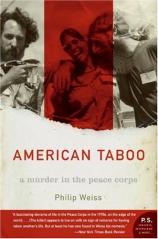Reading Group Guide
Discussion Questions
American Taboo: A Murder in the Peace Corps

1. How would you characterize Deb Gardner? When she complained to Vic Casale that "a single-girl's life was the worst" in Tonga, what social customs and norms was she referring to? Do you think life in Tonga would be jarring to a newly liberated, American woman in the 1970s? After her murder, which group smeared her reputation, warning that "once out, all out," insinuating that she was "the village bike ... searched for drugs ... hadn't had the modesty to wear underpants to her own murder"? Did the Americans display the individualism and progressive attitudes Deb tried to inculcate in her Tongan students? Do you think such attitudes have changed over the past thirty years?
2. When the Tongan cabdriver drives Vic Casale and Deb Gardner down the wrong road, do you think Vic's actions were rash and judgmental? Do you think he was right? What do you think of Weiss's statement that the "government had prepared them for nothing and given them a load of propaganda"? Considering the goals the Peace Corps wished to achieve, do you think the volunteers were sufficiently prepared? Is it possible for a government institution to find a pragmatic solution to idealistic endeavors? Do you think the Peace Corps failed in this instance, even before the Gardner's death?
3. As the trial unfolded, how did the Peace Corps betray the tenets upon which it was founded, that it "has to be neutral"? Do you see the Gardner case as the result of a few rogue individuals, or as a systemic flaw in the organization? Some former Peace Corps volunteers didn't want to speak to Weiss because they didn't want to "tarnish" its reputation -- do you think exposing instances of hypocrisy and underhandedness in otherwise idealistic institutions strengthens or undermines an organizations ability to reach its goals?
4. How do you interpret Weiss's statement, "Tongans are so provincial that they are not at all provincial"? How do they know "better than citizens of a superpower where they stand in the world's estimation"? The palangis, the Americans, find themselves befuddled and sometimes dismissive of Tongan tapus, but given the disparate manner in which the two nations reacted to Gardner's death, would you redefine accepted definitions of terms such as "civilized" and "sophisticated"?
5. Weiss notes that the Peace Corps had "a hard and fast rule against posting volunteers in expatriate communities" because "expats lived apart from their own country and the host country as well, which meant that they had no code at all." Did the volunteer groups in Tonga, and their ensuing division into fakatonga and faka'Amelika factions lend credence to this notion?
6. Consider the Tongan concept of "mala'ia, or negative karma," the belief that "if somebody killed someone, it would catch up with him – he would die." How did it affect the Tongan's view of Deb Gardner's death, and the result of the trial? How did the crime affect the Americans? Do you think something fundamental is disturbed when a violation such as this is ignored? What do you think the basket seller meant when he told the Bird Lady, "You palangis say the funniest things"?
7. How did Peace Corps officials band together, "to preserve their own careers, to preserve the American presence in the South Pacific, to preserve the churchly image of the Peace Corps"? What steps did they take to undermine the Tongan prosecutorial case, Deb Gardner, the image of Tonga, and the crime itself? How would you characterize the Tongan directress, Mary George?
8. How would you characterize Dennis Priven? Do you believe that he suffered a moment of temporary insanity, as the defense claimed? Or, convinced he was "performing a service to society," did he plan the murder? Does the second explanation underscore the defense psychiatrist's assertion that Dennis "suffered from a serious mental disease called schizophrenia"? What about the psychiatrist in America, Lebensohn, who said that Dennis, "had suffered a bad break, maybe a psychotic break" but that he "wasn't a paranoid schizophrenic"? With such conflicting viewpoints, what do you think of the Tongan jury's decision regarding the case? What does author Phillip Weiss conclude? Do you agree?
9. Weiss refers several times to the book, The Ugly American. Graham Greene is another author who wrote extensively on European and American misadventures in tropical countries. Can you think of other novels written in a similar vein? Does American Taboo fit the propositions set forth by such novels–that westerners in the tropics suffer a sort of moral decay? How do western expectations and stereotypes play into the experiences they have in tropical countries? Do you think American Taboo validates the notion that Americans assume that there are no consequences for their actions on foreign soil? What do you think the title, American Taboo, refers to?
American Taboo: A Murder in the Peace Corps
- Publication Date: June 28, 2005
- Paperback: 416 pages
- Publisher: Harper Perennial
- ISBN-10: 006009687X
- ISBN-13: 9780060096878







